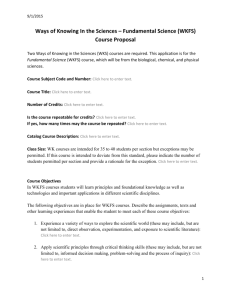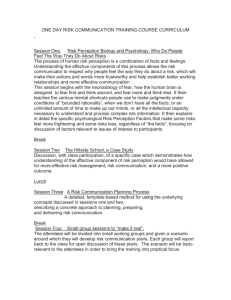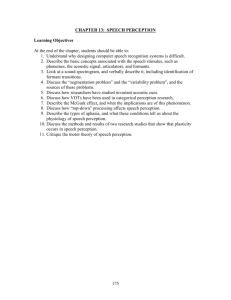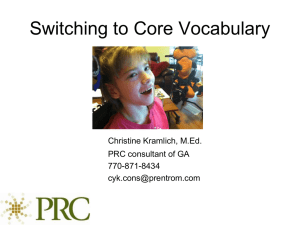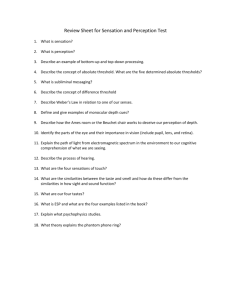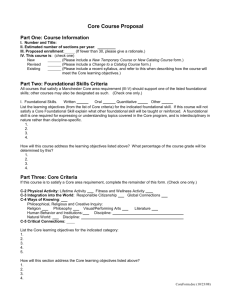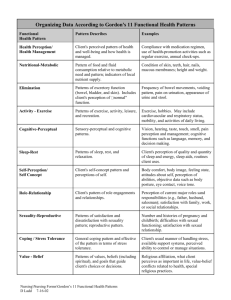Parent education session: Common core Q&A
advertisement
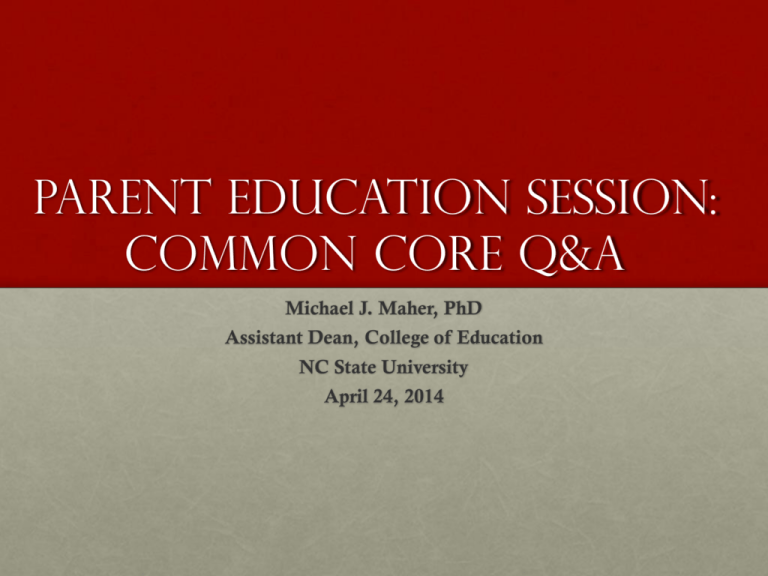
Parent education session: Common core Q&A Michael J. Maher, PhD Assistant Dean, College of Education NC State University April 24, 2014 Introduction • Michael Maher • Current: • Assistant Dean for Professional Education & Accreditation, College of Education, NC State • Oversight of teacher education and other school professionals programs (counseling, social work, school administration, psychology) • K-12 & Teacher Education Policy • Former: • Assistant Professor, Teacher Education • High School Science Teacher • Family • Two daughters enrolled in the Wake County Public Schools Foundational Concepts • Perception is selective • Perception filters through our past experience • Perception narrows when we perceive a threat to our sense of self, goals, or safety • Problems arise when our perception of a situation is incomplete or distorted Foundational Concepts • Perceptions and interpretations occur almost simultaneously • Interpretations come from our past relationships, it is the “story” we tell ourselves about what is happening Foundational Concepts • Different people tell themselves different stories about the same perception • Problems arise when: • we assume our story is the only reality Foundational Concepts • New goals for education require intellectually demanding experiences that are developmental and continuous as opposed to brief and episodic. • What we do in school can essentially be divided into two categories • Algorithmic: follow a set of established instructions down a singular path to one conclusion • Heuristic: a problem in which one experiments with possibilities to devise a novel solution What? • What is the Common Core? • The Common Core is a set of College and Career-Ready standards for grades k-12 in Mathematics & English/Language Arts • The standards represent goals for student learning • They are NOT a curriculum • They DO include both algorithmic and heuristic standards. When? • When were the Common Core standards adopted by NC? • The Standards were adopted by NC in 2010 • Full implementation began in 2012-2013 When? North Carolina first established a Standard Course of Study (SCOS) in 1898 • NC SCOS provides every content area with a set of competencies for each grade and high school course • The NCSCOS includes the Common Core Standards (Math & ELA) and Essential Standards (all other subjects) • Standards are regularly reviewed and updated (approximately every 5 years) WHy? • Why did NC adopt the Common Core Standards? • In 2010, NC was one of 12 states to win a federal Race to the Top grant totaling nearly $400 million. • One requirement of the grant competition was that the state utilize College & Career Ready standards. Who? • Who was involved in the development of the Common Core Standards? • The standards began with the work of the National Governors Association (NGA) and the Council of Chief State School Officers • The standards themselves were developed by teachers, content & pedagogy experts, administrators, parents, and state leaders in work groups and feedback groups. Where? • Where else have these standards been implemented • Forty-four states, the District of Columbia, four territories, and the Department of Defense Education Activity (DoDEA) have adopted the Common Core State Standards. How? • How do these standards impact teachers? • • • • Required professional development Increased collaboration Greater flexibility in developing curriculum Easier transition between grades How? • How do these standards impact children? • More rigorous • Fundamentally shift how we ask them to solve problems • Not only allows children (families) to move more easily between districts, but between states • Allows parents to make informed decisions about the quality of education since states will use common benchmarks & standards • Allows for more accurate international comparisons How? • Should I support the Common Core? • That’s entirely up to you. Common beliefs • The Common Core are Federal Standards • The Common Core was paid for by large corporations • The Common Core will increase testing in North Carolina • The is no way to modify/update the standards Questions? • Contact Information: • Email • mjmaher@ncsu.edu • Twitter • @mj_maher • Facebook • Professional Education @ NCSU • Website • http://mjmaher.weebly.com/ • Slides • http://www.slideshare.net/mjmaher Resources • Common Core Website:: http://www.corestandards.or g/ • NPR:http://www.npr.org/20 14/03/18/291166780/q-a-acrash-course-on-commoncore?ft=1&f=1013 • Atlantic:http://www.theatlan tic.com/education/archive/2 014/04/confusing-mathhomework-don-t-blame-thecommon-core/360064/ • Hechinger Report:http://hechingerrepor t.org/content/first-gradeteacher-dives-into-commoncore-with-cautiousoptimism_13033/ • http://hechingerreport.org/c ontent/parents-return-toschool-to-help-children-withcommon-core-inspiredhomework_13873/ • http://hechingerreport.org/c ontent/just-facts-pleasecommon-core-transformsschools-teach-writing_15452/ Resources • WUNC:http://wunc.org/post/fa ct-check-clearing-7-common-coreclaims • Edutopia:http://www.edutopia.o rg/blog/common-core-criticalthinking-aesop-vincent-mastro • US News & World Report:http://www.usnews.com/ news/special-reports/a-guide-tocommoncore/articles/2014/03/04/comm on-core-myths-and-facts • Education Week:http://www.edweek.org/e w/collections/common-core-inaction-report-2014/index.html • Common Core Hearing:http://youtu.be/CpBjio T7Z1Y 10:33 • http://www.usnews.com/news/s pecial-reports/a-guide-tocommoncore/articles/2014/04/17/comm on-core-honoring-the-societalcontract-of-success-througheducation

